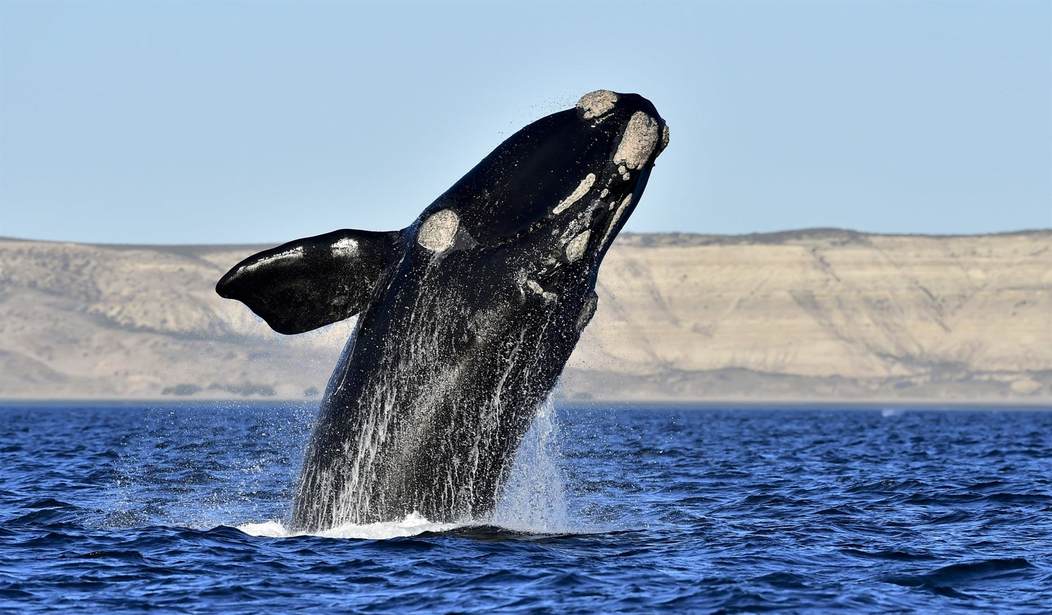Americans agree with protecting the endangered Northern Atlantic right whale. But true conservation efforts don't necessitate displacing lobstermen and recreational anglers in the process.
With fewer than 350 whales left, ambulance-chasing opportunists masquerading as conservationists conveniently swoop in on the whale’s behalf only to leave economic —and environmental—destruction in their paths.
This endangered whale requires protection from radical environmentalists who exploit them.
Last month, American lobster was added to Monterey Bay Aquarium Seafood Watch’s “red list” of food to avoid. It claimed the East Coast fishery “poses a risk to overfished or at-risk species” to right whales and added gear entanglement “is the leading cause of serious injury and death to North Atlantic right whales.”
Preservationists purporting to care about its well-being, however, distort the threats posed to the whales.
Regarding lobster gear entanglements, alarmists have deceived the public about the lobster industry’s impact on the marine mammal. Much to the chagrin of Seafood Watch, evidence shows gear entanglements aren’t solely to blame for the whale’s imperiled status.
A former legislator touted the Maine Lobstermen’s Association’s commitment to conservation in Bangor Daily News, explaining, “Maine has not only been a good steward of the lobster resource but a leader in North Atlantic right whale conservation efforts, even though the Maine lobster fishery has not been definitively linked to the entanglement of a right whale in almost 20 years.”
She added, “Maine fishermen removed floating rope at the surface in 1997, and in 2009 replaced 27,000 miles of floating line with whale-safe sinking line.”
Recommended
Dishonest brokers like Seafood Watch will happily sink the lobster industry, which employs over 4,500 people and contributes $1 billion to the economy, just to “save” the whale.
Radical preservationists similarly blame fishing vessels for contributing to the whale’s demise. In August, the National Oceanic and Atmospheric Association (NOAA) and the National Marine Fisheries Service (NMFS) ceded to special interests by proposing changes to the North Atlantic Right Whale Vessel Strike Reduction Rule. They argue, “Reducing vessel speed is one of the most effective, feasible options available to reduce the likelihood of lethal outcomes from vessel collisions with right whales.”
Recreational fishing and boating groups urged them to not proceed, citing the hastiness of the rule and failure to involve industry stakeholders. The letter warned anglers and boaters will “forgo boating and fishing trips altogether due to the time, cost and safety burdens imposed by the rule.” This move, in turn, would undermine industries that have a $700 billion economic footprint supporting 4.3 million jobs.
The Cape Cod News further warned the proposed vessel rule wouldn’t be contained to Massachusetts but extend to the entire East Coast.
“This is where is gets tricky because some of the proposed additional measures — which would apply all along the east coast and not just along the coast of Massachusetts — could affect the operation of high speed ferries between Boston and Provincetown and between Hyannis and Nantucket, and consequently disturb local economies that rely on that transportation,” the paper observed.
Instead of disrupting livelihoods and public water access in the name of “protecting” the whale, there are more practical remedies available.
For instance, Popular Science touted a whale detection system used for sperm whales that can alert nearby ships “to change direction or slow down when a whale is in its path”—thus avoiding the displacement of watermen, anglers, and boaters. The same could be applied to the right whale.
Absent from the discussion is, perhaps, an actual threat to the Northern right whale: offshore-wind turbines.
The Biden administration and utilities like Dominion Energy are so waist-deep in wind energy, they’ve conveniently buried impact statements from public view. The Bureau of Ocean Energy Management (BOEM) has only provided this document on endangered species review. A 2018 report claims $1.5 million was dedicated to monitoring whales, but the report’s results are four years overdue.
As another Townhall columnist noted, large-scale offshore wind projects would severely disrupt the whale's well-being.
“Whales are sensitive to, and navigate by, sound,” wrote H. Sterling Burnett, Ph.D. “The subsea infrasound and vibrations generated by the turbines are virtually guaranteed to force the few remaining NARWs out of their critical migration corridors and into one of the busiest shipping corridors in the world. This would make a bad situation worse because ship collisions are already the largest single cause of NARW mortality. Even if the whales are somehow able to adapt to and tolerate the sound, the undersea monopoles would present new navigation hazards for them.”
That’s why the Committee for a Constructive Tomorrow (CFACT), an organization I work closely with, has retained legal counsel to challenge Dominion Energy’s proposed Coastal Virginia Offshore Wind Project. Should the project advance, 176 turbines costing a whopping $10 billion would be constructed along Virginia’s coastline.
CFACT’s lawsuit intends to save the right whale from further exploitation by radical environmental organizations who actively undermine balanced use in public waters.
Thanks to frivolous lawsuits that stem from “sue and settle” agreements and rulemaking efforts like this, fewer than three percent of endangered or threatened species ever get delisted. And the Northern Atlantic right whale is also a victim of these efforts by special interest groups.
Let’s save the right whales from radical environmentalists who hold them captive in the courts. Instead, the U.S. must pursue true conservation efforts that not only benefit whales but people, too.

























Join the conversation as a VIP Member